#probably 19c
Explore tagged Tumblr posts
Text
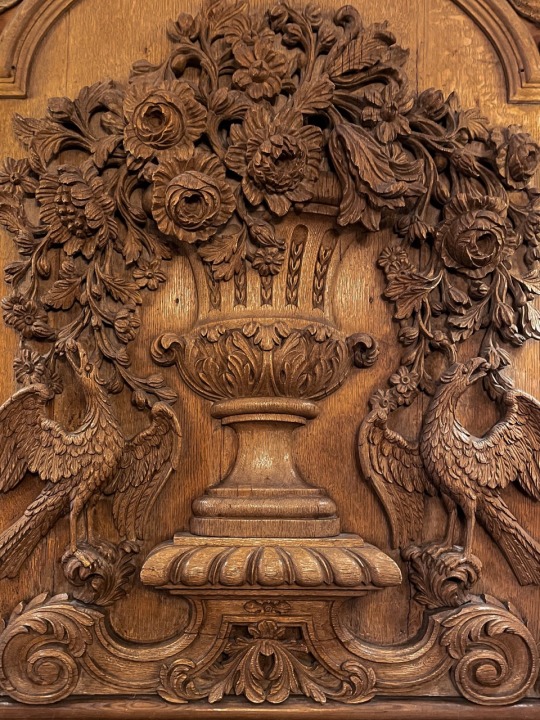
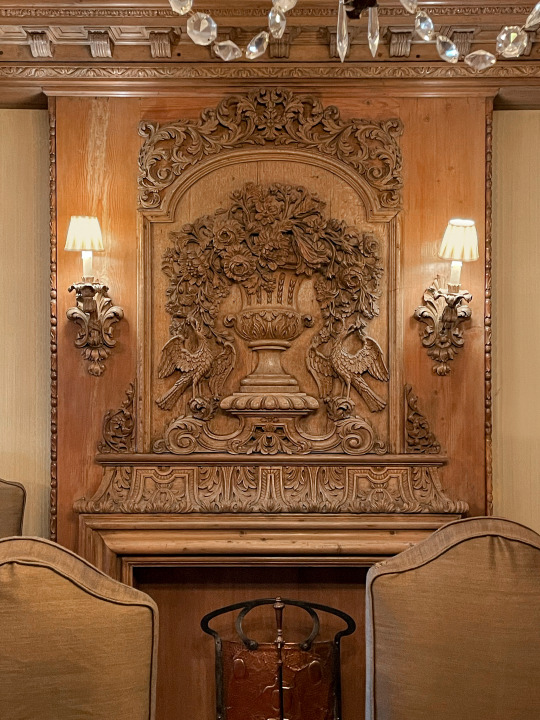
Couldn't resist this gorgeous ornately carved wooden panel above a mantelpiece in the boardroom at Fortnum & Mason
#probably 19c#art#sculpture#carving#wood carving#detail#art detail#interiors#interior#london#studyblr#studygram#studyspo#bookblr#books#inspiration#aesthetic#academia aesthetic#craft#craftmanship#wood#brown#warm
239 notes
·
View notes
Text
not to be like i'm better at latin than the pope professor of latin language and literature emeritus at harvard but i'm reading this guy's translation of an inscription in harvard's main theatre and it's dogshit. all the poetry and the beauty of the latin just completely obscured. fuck this
#and yes i do cry a little every time i get to sit in said theatre and think about my puritan forebears. sorry.#i think the problem ofc is that it's a 19C composition trying to be ciceronian but CRUCIALLY is not ciceronian in many important respects#and this guy who i am sure is long dead did not know or care about latin composed after oh 200CE probably#and you can tell! the english is reaching for that antique effect and failing!#whereas the latin is aware of what it's trying to do but not nearly as complex as you'd really get in 1st century BCE latin#it's a very skilled composition though - would love to know who did it - but it is unmistakably a neo-latin situation and not antique#rare pic of me in the wild
1 note
·
View note
Text
yes this and: because women (and girls, as young as they were able) were manufacturing at a huge scale, the industrial revolution hit poor family's budgets hard. Spinning jenny? Suddenly thousands upon thousands of women and girls no longer earnt a little extra income from carrying a spindle everywhere. There was a lot going on, it was a period of huge change, but one of the changes was how women were/ weren't able to earn their own money and help support their families via fibre work.
a phrase that kinda bothers me when talking about women's historical roles in europe is "cooking, cleaning, and taking care of the children." you hear it so often, those exact words in the same order even. and once you learn a little more you realize that the massive gaping hole in that list is fiberwork. im not an expert and have no hard numbers, but i wouldnt be surprised if fiberwork took up nearly as much time as the other three tasks combined, so it's not a trivial omission.
it's not a hot take to say that the mass amnesia about fiberwork is linked to the belittlement of women's work in geneal, but i do think there's a special kind of illusion that is cast by "cooking, cleaning, and taking care of the children." you hear that and think "well i cook and clean and take care of children (or i know someone who does) and i have a sense of how much work that is" and you know of course that cooking and cleaning were more laborious before modern technology, but still, you have a ballpark estimate you think, when in fact you are drastically underestimating the work load.
i also think that this just micharacterizes the role of women's work in livelihoods? cooking, cleaning, and taking care of the children are all sisyphean tasks that have to be repeated the next day. these are important, but not the whole picture. when we include all kinds of fiberwork—and other things, such as making candles or soap—women's work looks much more like manufacturing, a sphere we now associate more with men's work. i feel like women's connection to making and craftsmanship is often elided.
#this is only tangential to the point of the post really#but i cannot get the 19C norwich weaver stories out of my head and this is all tied to that#i am probably doing the 'knows a tiny bit about one thing and immediately makes confident incorrect claims on tumblr' thing oops
36K notes
·
View notes
Text
Why Mr. Rochester and Bertha Mason Couldn't Get a Legal Separation; or, the Utter Madness of Marital Laws
So I saw a Jane Eyre post discussing why Mr. Rochester and Bertha Mason couldn't get a legal marital separation. I've thought a lot about this topic, and in order to procrastinate writing the final for my upper-level Brontë class, I've decided to write this sort of convoluted analysis instead. I know many others have written about this subject, but I wanted to explore a bit further on my own.
Preliminary context about me, the Brontës, their Byronic inspiration, etc.: I've learned a lot about 19th century British marriage laws recently in my classes on old British literature, as well as by having studied Byron, whose marital separation in 1816 was a notorious part of his history & also reverberated through 19c literature. He refers to this separation in many of his works, most famously in his notorious poem "Fare Thee Well." Harriet Beecher Stowe, the most famous American female writer at the time, was friends with Lady Byron and wrote a book defending her called "Lady Byron Vindicated: A history of the Byron controversy from its beginning in 1816 to the present time" (the original callout post).
Insanity accusations did factor in to Byron's separation. Many scholars have remarked how the Queens of Byronic Criticism, the Brontë sisters, took significant inspiration from their well-worn copy of Moore's biography Life of Byron when creating their works. The Brontës would have been very familiar with marriage laws not only due to their knowledge of Byron's trainwreck of a marriage, but also due to being well-educated women at the time who knew that marriage was the most important economic decision of one's life and could very well make or break a person. As a result, marriage plays a significant role in their novels.
More relevant preliminary context about the novel: Jane Eyre actually takes place in the Georgian era, despite most adaptations and anaysis presenting is as a Victorian piece due to the novels publication date (this drives me crazy; same goes for the other Brontë books). Marriage laws did not change drastically from the time the novel is set to the time Brontë was writing the novel, but things were a bit different socially. Rochester was also married 15 years before his attempt to marry Jane. According to this very good analysis, Rochester and Bertha probably married in or around the year 1793: https://jane-eyre.guidesite.co.uk/timeline.
Now, here are the reasons why Rochester couldn't separate from Bertha:
1) Insanity wasn't grounds for divorce/separation in the Regency era.
Rochester himself says that he couldn't legally separate from her because of her insanity, which presumably rendered any of her faults null on the grounds of that marital vow "in sickness and in health." This is possibly one of his biggest reasons:
"I was rich enough now – yet poor to hideous indigence: a nature the most gross, impure, depraved I ever saw, was associated with mine, and called by the law and by society a part of me. And I could not rid myself of it by any legal procedings: for the doctors now discovered that my wife was mad — her excesses had prematurely developed the germs of insanity [..]"
2) Divorce was nearly impossible anyway.
There had only been around 300 divorces in English history at the time. Almost all of them were husbands divorcing their wives for committing adultery. Only a handful of divorces had succesfully been obtained by women, and they were only in cases where the husband had committed incestuous adultery or bigamy, and was extremely physically cruel. So technically after his bigamy attempt, Bertha may have had more grounds to obtain a divorce than Rochester would have, if only she were lucid enough to do so. However, in that scenario infertility would have helped their case, and Adèle's existence would have harmed their case if he attempted to seek a divorce before marrying Jane. Though as the novel explains, Adèle is probably not his, she definitely would have been used against him, as would the fact that he kept Bertha's existence a secret in England. But he wouldn't have tried for divorce that late in the game anyway, considering it was one of the most difficult options.
3) Female adultery was your best bet at divorce or separation, and this probably wasn't applicable to Mr. & Mrs. Rochester.
Although some scholars claim that there is subtext hinting that Bertha was adulterous (which some adaptations, like the 2006, include), you needed substantial proof of the adultery, which Rochester may not have had if it did occur. Being a proud man, he also wouldn't have wanted to be humiliated in that way by letting it be publicly known (as shame is one of his main reasons for hiding their marriage to begin with).
However, I lean toward the idea that Bertha may not have committed adultery. If she definitively did, seeing how affected Rochester was by Céline cheating on him (he shot her lover in revenge and left her with a stipend), if he ever suspected adultery on Bertha's part then I'm sure he would have been at court the very next day. I also think Rochester tries not to be too much of a hypocrite, and he is well aware that he himself is an adulterer, so he probably doesn't want to accuse Bertha of a crime he's committed and which he couldn't definitively prove she did.
Rochester does talk about hating Bertha's "vices" when they lived together, citing drinking, arguing, cruelty to servants, cursing, her being "unchaste," a "harlot," etc. - the last epithets, combined with her supposed lack of morality, and her being described as seductive, heavily imply that adultery could be added to her list of offenses. However, if she did truly cheat on him as well, I don't see why he wouldn't plainly tell this to Jane as well. I would imagine it would be his first complaint, and it would probably be considered his most justifiable reason against her by their cultural standards.
I don't see why he wouldn't jump to take Bertha's infidelity as an opportunity to defend his own actions, considering how open he is with Jane about his own adultery and being cheated on by Cèline Varens. While I can see how some of the textual evidence may strongly suggest Bertha's adultery, we cannot be fully certain, and that may be because Rochester himself is not fully certain. I cannot see why he wouldn't have sought legal advice on that account alone.
In short, if Bertha was an adulterer, there must have been no evidence to convict her.
Also: while the double-standard may seem odd and trivial to us, the reason why female adultery held more weight than male adultery has entirely to due with old patriarchal inheritance laws; i.e the risk of a wife getting extramaritally pregnant and passing the illegitimate child off as her husband's heir was considered too great of an affront. A man could have as many bastards as he wanted because he would know they were bastards and were not at risk of inheriting his stuff. One needed legitimate heirs to justify passing on one's ancestral wealth to. Essentially, marriage was a mere economic tool, and the economy was and is inherently patriarchal. I digress.
4) Rochester's lack of social & economic leverage, and risk of social ruin in general.
Only the wealthiest of the wealthy could obtain divorce or official separation, and it often led to social ruin. Rochester is rich, but he has no title and no great network of supporters due to being a younger son and having been abroad for most of the past 15 years (this was the length of his marriage to Bertha, stated by Mr. Briggs during the bigamous wedding attempt). He doesn't have as much leverage as Lord and Lady Byron had.
To continue on official separation, like Lady and Lord Byron obtained. Just like divorce, this was also a messy and scandalous legal proceeding, and required numerous good reasons to obtain, and being well-connected Lords and Ladies really helped your case. You also needed many witnesses and written statements as evidence. Bertha's family, as we see with Mason, would have been unhelpful to Rochester, and due to his shame and secrecy, no one could really testify on his behalf I'm assuming.
5) Unofficial separation would have been inconvenient, especially in regards to living situations.
Aside from divorce, which was extremely rare, extremely controversial, and only for the wealthiest members of society — there were unofficial and official separations. An unofficial separation was simply living apart from one another. I've often wondered why Rochester didn't simply move Grace Poole and Bertha somewhere else, but my main theory is that it would have been cost ineffective, and due to his family who were implied to be shitty, he probably really didn't want to live at Thornfield anyway so thought it would be convenient to place her there. Rochester says it would be dangerous to place her in his other residence of Ferndean:
"[..] though I possess an old house, Ferndean Manor, even more retired and hidden than this, where I could have lodged her safely enough, had not a scruple about the unhealthiness of the situation, in the heart of a wood, made my conscience recoil from the arrangement. Probably those damp walls would soon have eased me of her charge: but to each villain his own vice; and mine is not a tendency to indirect assassination, even of what I most hate."
6) Annulment was likely impossible given their circumstances.
Annulment means evaporating the marriage, acting as if it never existed, that it was a mistake. This was rare and only granted in unique circumstances, and I believe it was more common with aristocracy and royals. I believe you could possibly get an annulment if you could prove that the spouse was insane at the time of the wedding and you did not know. However, Bertha did not begin to truly deteriorate until after they had been living together for a bit. And while Rochester says that he did not know her mother was in an asylum until after the wedding, having an insane mother doesn't mean that you are insane, which Bertha clearly wasn't at that point, at least not in a way that people would have publicly acknowledged, since Rochester says she attended parties and her hand was highly sought after.
Generally, the longer a marriage had gone on, the harder it was to prove why it could not go on. Rochester says that he and Bertha "lived together" for "four years" in Jamaica while her condition deteriorated and he tried to make things work. And again, after the wedding he found out her mother was "mad, and shut up in a lunatic asylum." So we have more reasons for Rochester's difficulty: the fear of Bertha going to an asylum while she was still mostly lucid in those first four years, combined with the fact that they openly lived together and certainly must have consummated their marriage (things which would further prevent annulment), and were certainly publicly recognized as a couple in Spanish Town society, and her family wanting the marriage to continue so she could have children of "good race" i.e. to produce heirs.
Here's an important passage that to me suggests that Rochester and Bertha not only had an initial flirtation but likely consummated their marriage, likely had a passionate sexual relationship for some time, and likely implies his feelings for her were more complex than we'd initially assume, making annulment not so clear-cut of an option to him at the time:
"My father said nothing about her money; but he told me Miss Mason was the boast of Spanish Town for her beauty: and this was no lie. I found her a fine woman, in the style of Blanche Ingram; tall, dark, and majestic. Her family wished to secure me because I was of a good race; and so did she. They showed her to me in parties, splendidly dressed. I seldom saw her alone, and had very little private conversation with her. She flattered me, and lavishly displayed for my pleasure her charms and accomplishments. All the men in her circle seemed to admire her and envy me. I was dazzled, stimulated: my senses were excited; and being ignorant, raw, and inexperienced, I thought I loved her. There is no folly so besotted that the idiotic rivalries of society, the prurience, the rashness, the blindness of youth, will not hurry a man to its commission. Her relatives encouraged me; competitors piqued me; she allured me: a marriage was achieved almost before I knew where I was. Oh, I have no respect for myself when I think of that act! — an agony of inward contempt masters me. I never loved, I never esteemed, I did not even know her."
7) Spousal abandonment wasn't possible, and on some level he honored his legal and financial obligations to her and the Mason family.
Bertha's family likely refused to house her for legal and personal reasons, and spousal abandonment was forbidden due to the husband's financial responsibility as well as the law of coverture (a wife became her husband's full legal responsibility; some say "property"). Like we see in Anne's Tenant of Wildfell Hall, if a woman ran away from their spouse they would have to live in obscurity and be at risk of being sussed out. You couldn't just abandon your partner. Still, people did, because it was the easiest route to take.
But the more upper-class you were, and the more financial entanglements you had, the more inconvenient this was. We know that Rochester and his family became enmeshed with the Mason family, and he got a lot of money from Bertha, so her father likely would have taken him to court. At any rate, Rochester was legally bound to bring Bertha with him to England when he left Jamaica. If he attempted to abandon her in Jamaica, the backlash it would have brought would have brought him social ruin and foiled his chances at getting away with any bigamy attempts.
All this brings us to a further notice of Bertha's family situation. Based on Charlotte Brontë's positive comments about Rochester's character (https://www.tumblr.com/burningvelvet/731403104856195072/in-a-letter-to-w-s-williams-14-august-1848) I see no reason to suspect him, like many feminist critics do, of being an unreliable narrator or of lying about Bertha Mason's history. Everyone is entitled to their opinions, and in mine, that is simply not the novel Charlotte wrote. By her own admission, she wanted his narrative to be a path to further goodness.
It makes no narrative sense for our explanation of his and Bertha's history to be full of lies when he's trying to make ammends with Jane, who never suspects him of lying during his admission, but who does critique him and figure he'd tire of her like she was one of his many mistresses. Jane wonders if Rochester would lock her in an attic too, which he refutes on the basis that he loves her more than he loved Bertha when she was sane, and so he would care for Jane himself. Jane also tells him that it's not Bertha's fault that she's mad. So in my opinion, if Charlotte wanted us to believe Rochester was lying about his and Bertha's history to make himself look better or Bertha look worse, I don't see why she would have been vague about it, and I don't see why Jane wouldn't have called it out like she does everything else. I don't think Rochester is really a villain who locked his harmless wife in the attic for giggles; I think he weighed most of his options and found, like most people back then and even today, that keeping his problems locked up and ignored was the best solution.
Now, on with the point. I have often wondered why Rochester didn't simply "unofficially separate" from Bertha by leaving her with her family when he left. Why did he take her to England? Why didn't he just run away? It wasn't because he was an evil villain who wanted to keep her as a trophy. It's because 1) I don't think her father would have let him, as he was so quick to marry her off, 2) he felt obligated to her, and 3) it was criminal for men to abandon their wives, and it would have attracted publicity, which is what Rochester was avoiding by taking Bertha to England and sheltering her in secrecy.
Many claim that Rochester's adultery is a betrayal of his wife; and while religiously, narratively, socially, we can accept this statement, it was not legally a crime. While Rochester does honor his financial and legal obligations to his wife and her family, he does not take the religious part of the vows into account, and that's why he's cosmically punished and only rewarded after he repents, as he explains toward the end of the novel.
Another interesting point is that when Rochester recounts his decision to move back to England, he tells us that Bertha had already been declared insane in Jamaica and that she was already confined there (presumably around the 4 year anniversary before they left), meaning her father probably knew about confinement:
"One night I had been awakened by her yells (since the medical men had pronounced her mad, she had of course been shut up) — it was a fiery West Indian night; [..]"
Locking away "insane" people was standard procedure then, and if this was done with Bertha's father's knowledge, considering he locked his own wife away in an asylum, then this further absolves Rochester of a lot of the blame in my opinion. It more than likely wasn't his idea to lock her away, but the advice of "the medical men" and presumably her father's consultation as well.
8) Even if he divorced or separated from her, he couldn't remarry. Attempting these, or getting caught attempting abandonment, would have brought negative publicity that would have likely prevented the success of any future bigamy attempts. To him, secrecy and bigamy seemed better chances at securing happiness than the social ruin and likely failure the other options would have brought him.
Aside from Rochester's own explanation (which I supplied in #2 re: the separation veto inherent to Bertha's insanity), the other biggest reason as to why Rochester wouldn't seek a separation/divorce even if she hadn't been declared insane and even if he were willing to accuse her of adultery truthfully or not, is due to the fact that one could not legally remarry upon separation or divorce (unless you were Henry VIII and got God's permission lol). Rochester's impossible dream is that he wants to be married to someone he really loves, and if secrecy and bigamy are his only options then he is willing to succumb; this is shown in numerous passages:
"[..] I could reform — I have strength yet for that — if— but where is the use of thinking of it, hampered, burdened, cursed as I am? Besides, since happiness is irrevocably denied me, I have a right to get pleasure out of life: and I will get it, cost what it may."
"I will keep my word: I will break obstacles to happiness, to goodness — yes, goodness; I wish to be a better man than I have been; than I am — as Job's leviathan broke the spear, the dart, and the habergeon, hinderances which others count as iron and brass, I will esteem but straw and rotten wood."
"Is there not love in my heart, and constancy in my resolves? It will expiate at God's tribunal. I know my Maker sanctions what I do. For the world's judgment — I wash my hands thereof. For man's opinion — I defy it."
Closing remarks on the above's validity: I can't cite all my sources because a lot of this stuff I learned from lectures via my professor who specializes in 19th century English literature & history. But here's some recently published information from a historian, taken from "Inside the World of Bridgerton: True Stories of Regency High Society" by Catherine Curzon (2023):
"And if you were one of the newly-weds, you really did hope things would work out, because in the Regency till death do us part wasn't just an expression. As the Prince Regent himself had learned when he separated from his wife within eighteen months of their marriage, obtaining a divorce in Regency England was no easy matter. He never achieved it, and for those who did the stakes could be high and the cost ruinous in every sense."
"Until the passing of the Matrimonial Causes Act of 1857, which legalized divorce in the civil courts, it was governed by the ecclesiastical courts, and the Church didn't end a marriage without very, very good reason. Even these divorces didn't allow a couple to remarry, though, and they were more akin to what we would today call a legal separation, with no shared legal or financial responsibilities going forward. It was freedom, but only to a point."
"The only way to obtain a complete dissolution that allowed for remarriage was to secure a parliamentary divorce, and these were notoriously difficult to obtain. They began with a criminal conversation case, because they relied on adultery by one of the parties to make them even a slight possibility. If a woman committed crim. con., her life in polite society was over."
#jane eyre#lord byron#charlotte brontë#charlotte bronte#byronicism#marriage#divorce#marriage laws#english history#english legal history#mr. rochester#bertha mason#mr rochester#analysis#literature#english literature#history#Inside the World of Bridgerton: True Stories of Regency High Society#regency era#georgian era#19th century#1800s#victorian#Catherine Curzon#interesting#essays#the bronte sisters#the brontes
368 notes
·
View notes
Text
An Impromptu Ranking of Hugolian Adoptive Parental Figures
Ursus,The Man Who Laughs : I know everyone's going to want Valjean to be first place, but he's not. Ursus takes the lead not only because he's got two adopted kids, but because he does what no other dad-mom-general-adoptive-parent on the list does, and actually does the grubby hands-on work of Raising Kids. He doesn't have maids or nannies or nuns or any help; he's just a guy living in his traveling van and raising up a couple kids (who arrived at his door horribly sick and injured, even, which he manages to treat?? ) with zero support except for a literal wolf. He's honest with them and openly loving and teaches them how to survive in their own time and society. Too bad about the kids existing in a really bleak Hugo novel, but you did great, Ursus. 10/10.
Jean Valjean, Les Miserables: He loves Cosette SO much and tries SO hard! Second place only because (1) during the convent years, he sees Cosette for one hour a day , and while that limitation is definitely not his ideal choice,it does mean he's just not the constant primary caregiver the way Ursus is and (3) More Trauma means More Problems, and especially So Many Communications Issues. Plus a really really misguided faith in the importance of attaining bourgeoisdom. IDEK , man. Heroic efforts, heroic failures, 18/18 Napoleonic Antithesis Points maybe?
Lethierry, Toilers of the Sea: a decent normal guy raising his niece, who has very normal 19C Dad Faults-- too much trust in stereotyped gender roles, and too much focus on his job at the expense of his domestic life. Absolute middle of the road, not heroic as a parent but also doesn't do anything that makes me go "holy shit NO , dude" . He's just a humanly flawed but caring parental figure. 5/10 complete middle of the road
Cimourdain, Ninety-Three: Listen I LIKE Cimourdain. I respect his whole narrative arc. I think he's probably the most interesting character in the novel. But he loses Parenting Points for (1) not being the primary hands-on caregiver for large chunks of his adopted kid's life and (2) uh. the whole. the thing where he kills his adopted kid. There are circumstances yes I know but still . If you are directly responsible for the death of your kid you are going to lose points in the parenting games. That's just how it is. 4/4 with full symbolic meaning of the number.
Frollo, Notre Dame de Paris: HOLY SHIT NO, DUDE.
Semi-adopted THREE kids and TWO died horribly and he directly threatened the life of the last one. Even before then he's not a GREAT parent, largely leaving the raising of his sort-of sons up to others, locking one up in a single building, letting another fall into addiction, and the third go starving and homeless on the streets. So it's already not doin' great but arguably he's Trying?
But then he wants to bang a teenager, and decides they're all expendable. Absolute worst reason for the absolute worst parenting decisions. 8/8 you ARE the Fatalité , dude, look within and quit blaming your issues on teenagers.
Honorable Mentions: Radoub, Ninety-Three: gets the "like a mother" comparison, goes through a firefight for his adopted kids, stays sweet and cheerful and soft around the babies to the end. Gets set here because he's NOT an adoptive single parent, he's actually co-parenting with the kids' birth mom and they are delightful platonic parenting partners. We wish you, Michelle, and the kids all the best , Radoub! Good job getting out of your novel without killing anyone you love!
Gavroche, Les Miserables: OK he only manages to adopt the momes for an evening, and for an adult I'd be docking All The Points for that, but for an unparented 12 year old he is doing GREAT. He even kept looking for them afterwards! The biggest and most sincere You Tried star for you, Gavroche, it's not your fault you're all getting atomized hard enough to explode a barricade.
Dishonorable Mentions:
Gillenormand, Les Miserables : If you're gonna hold a kid as a financial hostage and destroy his dad's life because the kid's soooooo important to you, you might also try making sure that kid has any way to know that you actually give a damn about him? Maybe at least don't beat him with sticks? Legos be under your feet forever, Gillenormand!
The Slaveowner Uncle in Bug Jargal : absolutely perish
#The Man Who Laughs#Toilers of the Sea#tagging on the off chance there's more of us fans of those two out there#Hugo Adoptive Parents ranking
38 notes
·
View notes
Text
nbdc anyway but. I feel like I have a lot to say abt some 19c antebellum/acw historical figures, and the connection between many of them which probably doesn’t mean anything to most of the fandom, but did exist. No im sorry i didn’t mean to be arrogant at all just realized i simply meant i discovered new ships that probably wasn’t aware by the fandom people but im craving for food on ahhhhhhhh😭😭😭
Recently find the Sumner/Chase dynamic quite interesting….like Chase is somewhat adoring and feeling jealous of Sumner in multiple ways including Sumner being very friendly with his daughter I wasn’t aware of that cuz tbh I’m not familiar with Charles Sumner, but then im rereading Gore Vidal Lincoln and he actually depicted many scenes of Chase and Sumner and Kate together and I realize what i wasn’t aware of half a year ago….really interesting subtle ship dynamic happening here
And also. Rose Greenhow and William Seward. I read her diary in the prison and all her appeal to Seward. I really want to find the 2022 new annotated version of that diary but it’s definitely so rare and I can’t find it online…The annotator as she said in the interview included an extra study on her relationship with Seward and im really curious about this point….And much more I don’t have time to look into yet but I will.
12 notes
·
View notes
Text
Etymology of 'mentor'
"wise adviser, intimate friend who also is a sage counselor," especially to one who is young or inexperienced, 1750, from Greek Mentor, in the Odyssey" the name of the friend of Odysseus and adviser of Telemachus (but often actually Athene appearing in disguise). The name perhaps ultimately means "adviser," because in form it is an agent noun of mentos "intent, purpose, spirit, passion" from PIE *mon-eyo- (source also of Sanskrit man-tar- "one who thinks," Latin mon-i-tor "one who admonishes"), causative form of root *men- (1) "to think" [Watkins]. Compare monitor (n.). Often capitalized, even in the general sense, into mid-19c. The general use of the word probably is via later popular romances, in which Mentor played a larger part than he does in Homer. Related: Mentorship.
—Etymonline.com
20 notes
·
View notes
Note
I will take my cold weather instead of your windy weather. I think windy is much worse. We had straight line winds a couple of years ago and the trees were falling like crazy. You could hear them crashing down and one fell between my house and my neighbor. We are going to have low temperatures of -3F / -19C this week but it is still better than the high winds you guys had as I can also put on more layers of clothes or stay inside.
Yeah... I'm used to windy weather and storms. I live on an island, right? There's really no escaping it no matter where you live on Anglesey, so you do learn to deal with it. But honestly, Storm Darragh is the worst I've ever experienced - and we got through a hurricane in our last house on the side of a mountain. This is the first storm I've actually been afraid of.
Our storms usually hit hard and fast, but this was SO long. We had about 20 hours of gusting at 85mph+ plus another 24 of 55mph+, and the storm came from the northwest rather than the southwest which we're used to. Surprising how much of a difference wind direction makes. We are really so lucky, because we know someone whose car is likely a write-off because their roof tiles fell on it... I will forever be thankful for my guardian angel who had our tiles fall 4 inches away from ours.
-19c is INSANE, but it's probably normal for you, right? I love bitching with my besties about weather differences (3/4 of them are in Texas so I'm a wimp in the heat and they're wimps in the cold hahaha)
3 notes
·
View notes
Text
PORN
Well, I've lost the post I wanted to reblog with this information attached so... I'm just going to post it:
porn (n.)
1962, abbreviation of pornography.
pornography (n.)
1842, "ancient obscene painting, especially in temples of Bacchus," from French pornographie, from Greek pornographos "(one) depicting prostitutes," from graphein "to write" (see -graphy) + pornē "prostitute," originally "bought, purchased" (with an original notion, probably of "female slave sold for prostitution"), related to pernanai "to sell" (from PIE *perə-, variant of root *per- (5) "to traffic in, to sell").
A brothel in ancient Greek was a porneion. In reference to modern works by 1859 (originally French novels), later as a charge against native literature; the sense of "obscene pictures" in modern times is from 1906. Also sometimes used late 19c. for "description of prostitutes" as a matter of public hygiene.
Pornography, or obscene painting, which in the time of the Romans was practiced with the grossest license, prevailed especially at no particular period in Greece, but was apparently tolerated to a considerable extent at all times. Parrhasius, Aristides, Pausanias, Nicophanes, Chaerephanes, Arellius, and a few other [ pornographoi] are mentioned as having made themselves notorious for this species of license. [Charles Anthon, "Dictionary of Greek and Roman Antiquities," New York, 1843]
I shall not today attempt further to define the kinds of material I understand to be embraced within that shorthand description [ hard-core pornography]; and perhaps I could never succeed in intelligibly doing so. But I know it when I see it, and the motion picture involved in this case is not that. [U.S. Supreme Court Justice Potter Stewart, concurring opinion, "Jacobellis v. Ohio," 1964]
E. Bray in The Medical Archives [December 1872] proposed porniatria for "the lengthy and really meaningless expression 'social evil hospital' ...." In ancient contexts, often paired with rhypography, "genre painting of low, sordid, or unsuitable subjects."
Pornocracy (1860) is "the dominating influence of harlots," used specifically of the control of the government of Rome and the election to the Papacy during the first half of the 10th century by the noble but profligate Theodora and her daughters. Pornotopia (1966) was coined to describe the ideal erotic-world of pornographic movies.
0 notes
Text
picked up my survivors from the latest art show yesterday (3 of the 4 I submitted, but the economy is in shambles so I'm honestly grateful I sold even one) and was remarking on how my opera fanart ones never* sell, maybe I need to just lurk outside the Wortham Center with a small foldy table and yell at passersby to peruse my wares until security chases me around the building, haha I'm just kidding... UNLESS?
and I spent a little while combing through the HGO website for any potential networking opportunities, and was delighted to learn that they have a queer-centric social group that is free to join if you purchase their smaller package of curated opere! How adorable! And yes, any such group is sure to already be crammed solid with artists far more talented than I**, but artists also tend to love each others' work and engage in the hallowed Passing Of The Same $20 Bill in their admiration. So I click through to see which three works of the 23-24 season made the cut for such a group...
...and one of them was Madame Butterfly.
*drags hands down face* I am so tired. Puccini wrote at least four opere in his life, we don't have to keep trotting out the most*** orientalist thing he ever did. We are nearly a quarter done with the 21st century! There are thousands of other opere that this house could put on! I will never for the life of me comprehend who is clinging to this milk-aged disgrace of a show nor why! Did you know Japan has opera houses of its own now, and presumably opera composers, and definitely opera performers? Maybe give one of their stories a shot instead of Giacomo "Heard About A Japanese Lady Once Through Several Rounds Of 19th-Century Telefono The Night Before His Project Was Due" Puccini? Even if you are absolutely compelled to trot this tired storyline out yet again by whatever deep pockets you're forced to hitch a ride in because we don't fund the arts properly in this country, surely
surely
you could at least have one of the other four works in the season be your second of three shows in the curated mini-season for the queer social group. They're doing a world premiere of Intelligence, about pro-Union women spying to undermine the Confederacy during the US Civil War! That could be fascinating! Or how about The Big Swim, the world premiere of the story of the Lunar New Year Race, which is actually written by people of the story's respective culture? That one's even in February, around the same time as the dusty outdated artifact they're rolling with instead! WHAT IS THE REASON.
*sigh* should i just. call and see if I can still go without dignifying MB with a ticket purchase. Or am I overreacting and should I just suck it up, buy the ticket package, and just not attend that show.
_ *except, in one happy instance, my extremely dramatic Pagliacci one of an eye with clown paint drawn to taper into a bloodstained dagger. God, I was proud of that one. And someone even bought it last year! **[Tony Soprano voice] it's a stereotype and it's offensive ***actually it's probably tied with Turandot for Worst Thing To Emerge On An Opera Stage From 19c. Yellowface Hell. Turandot is also a Puccini work, incidentally. Goddammit, Giacomo.
#oops it's a walltext#mayra has opinions about opera#abolish madame butterfly. society has progressed past the need for madame butterfly.
1 note
·
View note
Text
Equipment and Time Considerations
You will need a pullman's loaf pan, which is a bread pan with a lid. the reason just tinfoiling a regular cake loaf pan doesn't work is because a pullman's is also considerably deeper and longer that a regular loaf pan, it can fit about a store-sized loaf of bread. which. which it's where the sizing actually comes from, historically.
This is a sourdough recipe so you have to remember to keep your starter well fed AND that the proofing takes considerably longer than anything with instant yeast.
I've modified a bunch of timings throughout the recipe. While your average sourdough boule takes an overnight final proof (making it a 2-day loaf) and your average pullman's loaf recipe takes about an afternoon, this will take about a day's (little under 12 hours give or take) worth of time.
Also note that it is currently around 19C/66F so I've been using my lightly heated oven to keep the dough at decent proofing temps (idk like 70 to 85ish degrees fahrenheit? whatever the equivalent of a sunny window day is). You'll need to figure out your equivalent
Ingredients
Levain -50ish g active, full hydration starter -35g whole wheat flour -35g AP or bread flour -70g/mL water, lukewarm
Remaining Ingredients (Not doing an autolyse for this one) -500g/mL water, lukewarm -35g sugar -550g AP or bread flour -200g whole wheat flour -15-20g salt -65g butter or margarine, plus some reserved
Method
Prepare the levain by mixing all ingredients together in a glass jar (i reuse an old jam jar), covering top with cling wrap, and leaving somewhere warm-ish for about 4 hours. You'll know it's ready when it's doubled in size and has just begun to fall
If you're using a stand mixer, pour your active levain into it. (any other large bowl will do if you're doing hand mixing). Add the sugar and the water to the levain, mixing together.
Let sit for 15-20 min. (I do this to encourage a bit of rapid growth in the yeast, it ups the culture's concentration and takes a bit of the acrid sour out of the flavour profile)
mix in remainder of the ingredients, flours, salt, butter/margarine. If you're using a stand mixer, have it go for about 5 min on the lowest setting. I run mine longer, but I'm using my roommate's old model so the lowest setting is slower. If kneading by hand I would say about 10 minutes or so, and since this is a wet dough, the slap and fold method is probably the way to go.
transfer back to the bowl and cover with plastic wrap, place in a proofer/warm area.
Now it's time for initial proofing and series of stretch and folds. Wait a half hour, then do a stretch and fold. Repeat this cycle three times so you're stretching and folding a total of 3 times. (30min>S&F>30min>S&F>30min>S&F>30min)
Take your pullman's loaf pan and butter/margarine the bottom and sides
heavily flour a surface of choice. Scrape the dough out and let the dough rest on the counter for about 20 minutes
using a floured bench scraper,burrito fold the dough into a loaf shape (roll in sides first, then roll the long way) and transfer to the buttered loaf pan.
Let that rest in the pan for 10 minutes, then preheat the oven on bake at about 375F. The loaf should be out in the open with no lid for at least 20 minutes, otherwise it'll be too wet for the bread lame to score. (You also have the option of fridging the entire pan with a rice flour coated dish towel to get the same drying effect, but idk what the timeline'd look like for that)
lightly sprinkle some more flour onto the top of the loaf and score bread to your liking.
bake with the lid on for 40 minutes, then slide the lid off, raise temp to 425F and swap to broil setting (we want the heat coming from up top now) for about 15 minutes
cool bread off on rack and enjoy!!!!!!!
everyone!!! i may be generally full of sadness! but!!!
look at my mfucking LOAF OF BREAD

I am writing the version of the resippy i used today since I make tiny adjustments each time, so hold your horses it's comin!
4K notes
·
View notes
Text
LM 4.8.7
Y'all know i hate Gillenormand right? right
so him having his "worst person you know just made a good point" moment here really burns XD
but he's right! he's totally right! Cosette and Marius getting married in their current known-to-them circumstances is a terrible idea
and as much as Marius--and some readers--might be shocked by the idea that Marius should make Cosette his mistress .... that's how he's been treating her. Only seeing her at night, alone, behind her dad's back, no chaperone...that's not how a man of Marius or Gillenormand's class courts a potential wife. Never mind if they've been "chaste" ; if anyone else found out about how they've been carrying on, Cosette's rep would still be as ruined as if they'd been having freaky sex parties all night. Gillenormand may have 18C libertine morals in conflict with Marius and his 19C Respectability , but in this case it just means Gillernormand is sympathetic and not shocked or treating Cosette like a shameful scandal, just going "sure!! have your mistresses! :D "
Seriously, look at this conversation:
Marius did not reply. M. Gillenormand continued:-- "Then I understand the girl is rich?" "As rich as I am." "What! No dowry?" "No." "Expectations?" "I think not." "Utterly naked! What's the father?" "I don't know."
That is not describing a marriage-ready relationship!
...the first time I saw her was at the Luxembourg, she came there; in the beginning, I did not pay much heed to her, and then, I don't know how it came about, I fell in love with her. Oh! how unhappy that made me! Now, at last, I see her every day, at her own home, her father does not know it,
this is an affair. As Gillenormand points out:
As for the little one, she receives you without her father's knowledge. That's in the established order of things. I have had adventures of that same sort myself. More than one. Do you know what is done then? One does not take the matter ferociously; one does not precipitate himself into the tragic; one does not make one's mind to marriage and M. le Maire with his scarf. One simply behaves like a fellow of spirit.
(italics mine) There is a way relationships like this are treated by Society and it's not as an engagement.
Honestly...I loathe Gillernormand, but it's occurring to me that on this point, Marius is probably lucky his grandpa is Old School; a parent of Marius' own social morality might never forgive Cosette for this Indiscretion. But for Gillenormand, "pretty girls are pretty girls"; his philosophy, ultimately, has room for a woman of Questionable Virtue marrying up.
Marius , meanwhile, can't even understand that he's actually put Cosette's reputation into question. Marius, you booby.
#LM 4.8.7#not tagging this for the club bc who knows when I'll have brains to post again#Not me!!#but this just really hit me this go-round and I want to remember it
109 notes
·
View notes
Note
Rousseau body pillow
I hate you
24 notes
·
View notes
Photo
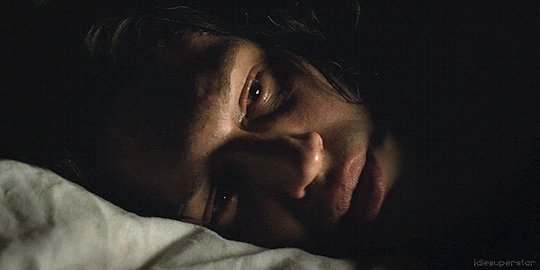

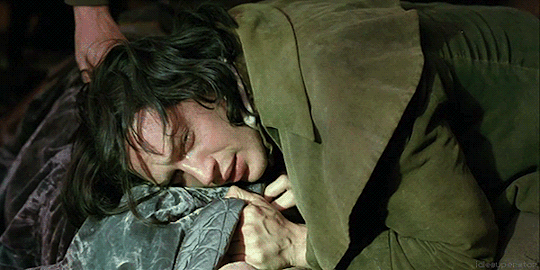



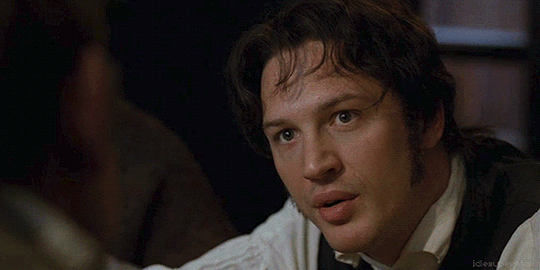

TV/Film versions of 19th Century Fictional Male Characters I Would Bang Into The 20th Century (In No Particular Order)
#7 Heathcliff [Wuthering Heights, Emily Brontë] - Tom Hardy edition (ITV, 2009)
#tom hardy#wuthering heights#heathcliff#god damn you tom hardy I have never found heathcliff attractive until now#and I did WH at school when I was 15#but this version is REALLY good and really makes him understandable#also when we watched this I had a REVELATION#(which has probably been had by many before but not by me)#that heathcliff isn't the alternative rochester#he's the alternative jane eyre#he gets fucked over by the world so much like jane does#and treated so cruelly by lots of people like jane does#but reacts to it in a different way#anyway yeah damn you to hell tom hardy how are you so consistently great#despite the wigs#my wee gifs#*19C
157 notes
·
View notes
Note

@brissot @anotherhumaninthisworld
You know, that's an interesting point. I didn't even want to speculate about potential political reasons because I don't think we have many sources about Mme Duplay's revolutionary/political approaches and actions. But it would sure make this whole thing even more interesting.
The problem is that both Charlotte's and Babet's memoirs are written in 19c as older ladies, and both women try their best to present themselves in typical domestic femininity light (Babet shows some political spirit, but the way she describes her mother, there is none of that). Charlotte notably presents herself as a "proper" woman who'd never do politics. Sure, it could be Laponneraye's sexism speaking, but it wouldn't be surprising that Charlotte herself pushed for the "I am a proper woman focused on domestic stuff and I never dabbled in politics, I know nothing about anything that was going on." Given that I see memoirs as Charlotte's "apology video" to her brothers, I can see her being fine or encouraging of Laponneraye's view of herself as a domestic-focused proper woman.
Now, we know Charlotte was anything but. There is enough proof to at least strongly imply about her being a revolutionary in her own right, and definitely not a Robespierrist. But I am afraid we don't have much proof about Mme Duplay. (?) The only thing I can think of is her death- kind of similar to SJ's friend Thuillier, which was definitely politically motivated. I admit I don't remember this part from the memoir about Mme Duplay accusing Charlotte about keeping counter-revolutionary company, but that would fit, too.
Not sure what to think about poisoning. I don't personally see any of the siblings actually wanting to kill the other - I don't believe Guffroy about Robespierre working to end Charlotte. It's not impossible, but it's such an unreliable source with his own interests and agenda that can't be trusted. And I don't see Charlotte working to end her brothers despite meeting Fouché lol. But I do believe that there was a big political tension between Charlotte and her brothers, and that Mme Duplay could have thought that Charlotte would do something bad to Maximilien (I mean, she did denounce her brothers in a way and was released soon after Thermidor while Mme Duplay died in prison and other Duplays stayed imprisoned for a long time. There has to be a reason for it.) And it's probable that the brothers saw Charlotte's behavior as politically unacceptable, though I don't know what they wanted to do about it.
Look. I will be perfectly honest. Charlotte and Mme Duplay/Duplays being open and active revolutionaries would be so interesting to me. Both from their specific situations, to the whole idea of a woman in the revolution vs expectations of femininity in 19c. And yes, it is certain that Duplays were Robespierrists, unlike Charlotte, lol. I am just trying to think of potential sources to research/explore this.
more on jamgate?
i read charlotte’s memoirs years ago but i dont remember the details
Sorry for my late reply! I love to call it "The Great Jamgate of 1793", but in truth I am unsure when it happened. Does anyone know when Charlotte persuaded Robespierre to come live with her, but then he got sick and Mme Duplay brought him back to Duplays? The jamgate happens after that. (So it could be the Great Jamgate of 1791 or 1792, lol).
Charlotte tells us how she loved making jams for her brother, who had a taste for sweets and fruits. She would send her maid to Duplays to deliver jams, and, according to Charlotte, Mme Duplay always had a snarky comment on that.
The worst happend one time when Mme Duplay sent the maid back, refusing to accept jams, saying something along the lines of "Bring that back, I don't want her to poison Robespierre".
Naturally and understandably, Charlotte was shocked and hurt. It was inded a shitty thing to say, even as a "joke". In line with the narrative Charlotte built about herself in the memoirs, she claims that she "swallowed her sadness" and said nothing to Mme Duplay or Maximilien (as to not cause him pain).
Of course, we have to remember that this is Charlotte's version of the story (we don't have one from Duplays), and Charlotte is not always the most reliable of the narrators. Still, the anecdote seems too specific to just be made up, so I am willing to believe that there was indeed a Great Jamgate of some sorts. We do know that Mme Duplay didn't like Charlotte much, and it's possible that she ridiculed her cooking skills. (Those two women seemed to fight over who would pamper Maximilien). Mme Duplay obviously saw herself as superior, and tbh, she probably was, but I doubt that she really thought that Charlotte wanted to bring harm to her brother (?)
Still, I can see Mme Duplay saying something snarky about Charlotte's cooking. But I can't guess anything more than that.
The way Charlotte described the Jemgate, it has all the typical story points of her narrative: there is always a harpy woman who hates her and tries to take her away from her brothers. The harpy is horrible, but she (Charlotte) never says anything because she is good and non-confrontational, and she doesn't want to hurt her brothers or cause any problems.
Needless to say, this goes against everything that we know of her character from other sources. Charlotte comes off as too outspoken and stubborn for this meek and obedient image she paints of herself, not to mention that she did get into fights with her brothers.
So it's difficult for me to trust her version of the Jamgate, even though I do believe that there was a Jamgate in some form. In my opinion, it reflected the two women's fight over pampering Robespierre - a fight he seemed to ignore (probably as a woman's thing, as if it wasn't happening because of him). As a sister to an unmarried man, Charlotte absolutely had all the rights to be the one to care for Robespierre and his household - it was an important duty that an unmarried sister would do for her brother. In that sense, Duplays overstepped the social boundaries, even if Charlotte was indeed bad at household duties (my theory is that she was too busy with the revolution but I don't have a concrete proof, except my wishful thinking).
Still, it was Robespierre's fault for not saying anything, and for not recognizing the social mistake of the situation. I believe he really felt pampered and cared for at Duplays in a way Charlotte could not provide (if anything, she was one person and Duplays had 4 women ready to pamper him). A different sister might not have cared, but Charlotte was obviously feeling rejected. Couple this with the Northerner vs Paris anymosity and you have a recipe for disaster. Robespierre not solving the situation is not surprising, given his character (I wonder if he noticed anything/knew/understood what's going on), but it's not an excuse, because it was on him to mediate between Charlotte and Mme Duplay, since the whole mess was about him.
123 notes
·
View notes
Note
could i have the import code for bible accurate (the wobbledog)? i have been trying to breed a biblically accurate angel dog for a few days and have failed every time
Oh I got more biblically accurate angels than you can wobble a dog at! I actually just finished my angel dog breeding project, so here's my personal favs and their codes.

First up is BibleAccurate from that one post. Very blue. Probably the most dog shaped out of the bunch.
60Ba3Fa38F8b8F0EPF^BEc-3D8DCP01C2Bad8a3800=b:B3PF9FA9=0CFfE<0;2<0E3C3a11aFaAc<EbEF^bCF5F74BBB0;74Dp6aB4=38F1^5C=9a;a1EbB6F9Aa3^3<7:4<Dc11;98c1ab;9<<2^b5E030a03CF;4;8A5C;41;:3870F81::4EF^6DY^43CC2CB9FBCd05C1bCCFCFFFElC0F2B^E0UFF017:1A.^81Ba=B0^BHAe4C2=lB1=A10113909EuaA86Ca41FdcE1ceE6dFB0C8F14FDF57F80CEF74^26eb24B432aC3

My personal fav! Has some interesting warped textures in the eye area which gives it this fun eyeshadow-y look. Kind of jittery and horrible at walking.
2^60b2=1EF:037b1b8723^C77D5^b.adF1111A:F48FA04PCCCC8;FC1D80FUECFCuF3a84DB58F5EC;4CBADEAAB0D1Ar<FAb:45D9658F59^=0eca;B<cbE1==aC:19c;=^1a384;24:976;23a7F:686<8:6846aA<430E7F62F<bF26<2B<382Cb.36B00209B5A9CF02F^a0F02P0F30AAk12==3Y1232P0971^6B2BAa^7430^s0693DA0917^3aFF6186C0EBE511a;8Eg5E;bC^3918B73b1EcD2FB8183FC000E4a80

This is Big Flappa, he has big wings.
453E8010338C7A5Db;AD560E1292Fd^1B10890F93D9FD0p0190F9C097^9Eb48c6Fa11A88910Fc^59CF2Db3B50D6FCbDaE301:B7E96D9A4=1b1;FC:aa=C=0;380c4=F7F8=;124:03^=CCDE;8C=8;;8C34c35;A3=f=64=3D1F2a<43^BC29F0<eFFFFF.FFFD8^A^FFCLHga=9 l3C7C68=079F4F1:^0^.373FE2C99BeFFbBp10BAC1aCiC3CCa41aFb80F7a:D7F3FAa9Cc2;1FFh80I6bdB87836:8^7c1^A7E880FB

The main goal I was aiming for with this project. Six heads, six legs, and TEN wings, along with a rad color scheme that only resembles pee a little bit.
F3C7ACa0E=D04e^b8F;1306F1E8b03F1E10F082b83688bi8= a1A3^aAF19B810a47598d68672a0FBCC=01f28088i0=FB3304Fr32F;D06C:230a088;;4ca74a3=4bd58CB=04C2<:F7377B04;=78:793:1C2a38DC3^3FA4c=F0:=C=19b7931aC<9F.13FC^F^0^aEFF2P0FA83sUPPP38.g3^0487C2CFD35^76s0538F1t9s;:a8hb09cE=C93CF00b;7BBDa=j371aA:90Y44F8DF5e00n6FE783j2^671AC:^6F8^5
Enjoy your abominations!
666 notes
·
View notes